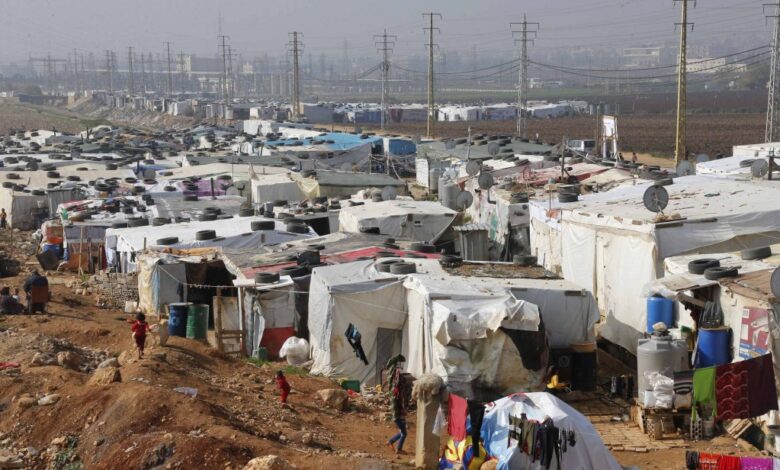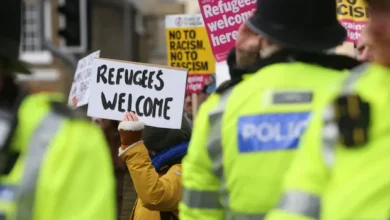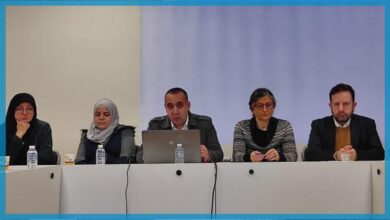Lebanon is Preparing to Deport 15,000 Syrian Refugees Per Month… and Human Rights Warnings

Asrar Shabaro – Beirut
The file of Syrian refugees in Lebanon is witnessing an unprecedented escalation, with the succession of official statements stressing the necessity of their return to their country, which amounted to a threat to Prime Minister Najib Mikati “to take an unpleasant position for Western countries, by removing the displaced through legal means in case the international community does not cooperate with Lebanon.”
The Minister of the Displaced in the government, Issam Sharaf El-Din, is following up on the file of Syrian refugees, and to this end he will visit Damascus in the coming days to discuss the plan of the Lebanese authorities, which is based on the return of 15,000 refugees per month, despite the warning of international organizations against forcible return after recording violations against a number of them. Of those who had previously returned to Syria.
Lebanon, with a total population of about 6.7 million, remains the country hosting the largest number of refugees per capita and per square kilometer, according to the United Nations High Commissioner for Refugees.
The number of Syrian refugees in Lebanon is about one and a half million, according to Sharaf El-Din to Al-Hurra website, “880,000 are registered with the UNHCR and 400,000 workers, in addition to those who enter illegally,” which means that his plan needs about 8 Years to complete its implementation, if we assume that each year 180,000 refugees will leave.
The suffering of the refugees continues.
Before the cannons subsided in Syria, some voices began to rise in Lebanon, calling for the return of refugees, to expand the circle of those demanding this return after the economic crisis that afflicted the country in 2019, as they were blamed for the collapse of the country at various levels.
Sharaf El-Din discussed with the representative of the Office of the High Commissioner for Refugees in Lebanon, Ayaki Ito, the issue of return. The initial response of the UN representative was to reject the matter before security was established in Syria, and to deliver the final response in writing after reviewing his reference.
Whatever the position of the Commission, Lebanon is insisting, as Sharaf El-Din emphasized, “to implement its plan,” saying, “This is our natural right, and I am authorized by the President of the Republic, the government, and 4 and a half million Lebanese, in order to lift the economic burdens on us, as we can no longer bear more.“
deportation
The issue of Syrian refugees grabs the attention of Lebanese officials, and it was highlighted by the Lebanese President, General Michel Aoun, during the consultative meeting of Arab foreign ministers, which was held at Baabda Palace on the second of this month in preparation for the Arab summit scheduled in Algeria.
Aoun said that “Lebanon is no longer able to bear the large numbers of refugees and displaced people on its land, and the position of the international community does not encourage finding quick solutions,” hoping for help to face these challenges.
“Village after village” is the base on which the “displaced people” will be returned, according to what Sharaf al-Din said, explaining to Al-Hurra: “We aim to facilitate the task for the Syrian state and ease its burdens, because the matter requires an absorptive capacity, from here we define a village or two. In Syria, and on the basis of the statistics that we have for the displaced, we ask the descendants of it to return to it, as the Syrian state has pledged to secure shelters for them and what they need in terms of infrastructure, hospitals, schools and all that is required for a safe and dignified return.
The “displaced people” need daily, according to Sharaf al-Din, “500,000 bundles of bread, 5 million gallons of water, and infrastructure in terms of sanitation, electricity consumption, and others,” stressing that “the Syrian displacement cost Lebanon 30 billion dollars over 11 years.”
As for whether the refugees will be forced to return, the minister replied, “Nothing happens under duress, and whoever works in Lebanon must obtain a work permit. As for the political refugee who thinks that there is a danger to his life in the event of his return, we asked the UNHCR to secure his travel to a third country, and the answer was That 9 thousand immigration applications for political refugees were secured, 5 thousand of them traveled, and 4 thousand remained on their way to leave, so my answer was that this number is not enough.”
UNHCR rejected Lebanon’s plan, which is based primarily on the absence of guarantees that returnees will not be subjected to violations such as arrest and torture, but the Minister of the Displaced confirms that “this statement is inaccurate, and information indicates that out of the 87,000 people who returned, only 34 were arrested on the grounds of Court cases, not security, as the returnees will be covered by the general amnesty law that Syria had approved.”
“serious” violation
The Director-General of Public Security, Major General Abbas Ibrahim, considered that “Lebanon and the Syrian people are victims of a major international conspiracy led by superpowers that displaced an entire people.”
Human Rights Watch criticized what it described as the unsafe and illegal forcible return of Syrian refugees by Lebanon, placing it in the context of Lebanon’s violation of its obligations not to forcibly return refugees to countries where they face a clear risk of torture or other forms of persecution.
The organization stressed that Lebanon is obligated “as a party to the Convention against Torture, not to return or extradite anyone at risk of torture. Lebanon is also bound by the principle of non-refoulement in customary international law – that is, not to return people to places where they would be at risk of persecution.”




